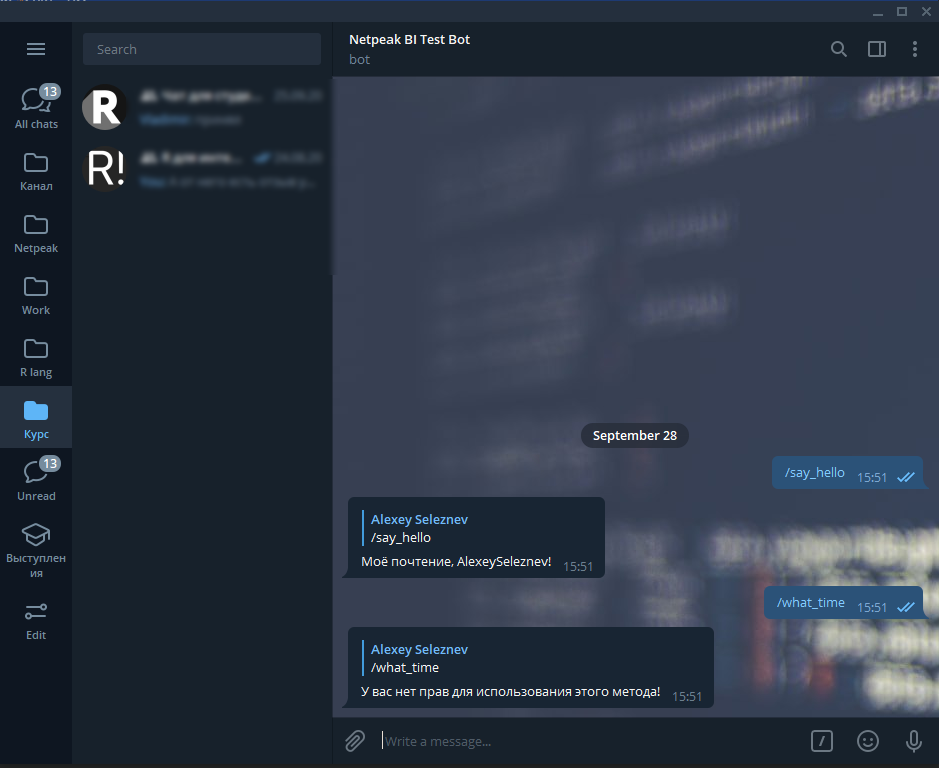In previous articles, we analyzed the topic of bot building in sufficient detail, from sending the first message to programming a logical dialogue with the bot.
This is the last article in this series, in which we will figure out how to manage the rights to use individual bot methods at different levels.

All articles from the series "Writing a telegram bot in the R language"
- We create a bot and send messages to telegram using it
- ,
telegram youtube . R.
-
2.1.
2.2. -
3.1.
3.2.
, , .
.. . , . , , .
, .
, 2 :
say_hello—what_time— ,
library(telegram.bot)
# Updater
updater <- Updater(' ')
#
##
say_hello <- function(bot, update) {
#
user_name <- update$message$from$first_name
#
bot$sendMessage(update$message$chat_id,
text = paste0(" , ", user_name, "!"),
parse_mode = "Markdown",
reply_to_message_id = update$message$message_id)
}
##
what_time <- function(bot, update) {
#
cur_time <- as.character(Sys.time())
#
bot$sendMessage(update$message$chat_id,
text = paste0(" , ", cur_time),
parse_mode = "Markdown",
reply_to_message_id = update$message$message_id)
}
#
h_hello <- CommandHandler('say_hello', say_hello)
h_time <- CommandHandler('what_time', what_time)
#
updater <- updater + h_hello + h_time
#
updater$start_polling(), ' ' , BotFather ( ).
, , .
, . , , - , .
, .
BaseFilter() MessageFilters. .
, BaseFilter() — message. , , . :
$message_id
[1] 1174
$from
$from$id
[1] 194336771
$from$is_bot
[1] FALSE
$from$first_name
[1] "Alexey"
$from$last_name
[1] "Seleznev"
$from$username
[1] "AlexeySeleznev"
$from$language_code
[1] "ru"
$chat
$chat$id
[1] 194336771
$chat$first_name
[1] "Alexey"
$chat$last_name
[1] "Seleznev"
$chat$username
[1] "AlexeySeleznev"
$chat$type
[1] "private"
$date
[1] 1601295189
$text
[1] " "
$chat_id
[1] 194336771
$from_user
[1] 194336771, , . , :
## ,
MessageFilters$admins <- BaseFilter(
function(message) {
#
message$from$username %in% c('AlexeySeleznev', 'user1', 'user2')
}
) c('AlexeySeleznev', 'user1', 'user2') — , , . .
## say_hello
MessageFilters$say_hello <- BaseFilter(
function(message) {
#
message$text == '/say_hallo'
}
)
## what_time
MessageFilters$what_time <- BaseFilter(
function(message) {
#
message$text == '/what_time'
}
)
#
h_hello <- MessageHandler(say_hello, MessageFilters$admins & MessageFilters$say_hello)
h_time <- MessageHandler(what_time, MessageFilters$admins & MessageFilters$what_time)AlexeySeleznev, user1, user2. .
:
library(telegram.bot)
# Updater
updater <- Updater(' ')
#
##
say_hello <- function(bot, update) {
#
user_name <- update$message$from$first_name
#
bot$sendMessage(update$message$chat_id,
text = paste0(" , ", user_name, "!"),
parse_mode = "Markdown",
reply_to_message_id = update$message$message_id)
}
##
what_time <- function(bot, update) {
#
cur_time <- as.character(Sys.time())
#
bot$sendMessage(update$message$chat_id,
text = paste0(" , ", cur_time),
parse_mode = "Markdown",
reply_to_message_id = update$message$message_id)
}
#
## ,
MessageFilters$admins <- BaseFilter(
function(message) {
#
message$from$username %in% c('AlexeySeleznev', 'user1', 'user2')
}
)
## say_hello
MessageFilters$say_hello <- BaseFilter(
function(message) {
#
message$text == '/say_hallo'
}
)
## what_time
MessageFilters$what_time <- BaseFilter(
function(message) {
#
message$text == '/what_time'
}
)
#
h_hello <- MessageHandler(say_hello, MessageFilters$admins & MessageFilters$say_hello)
h_time <- MessageHandler(what_time, MessageFilters$admins & MessageFilters$what_time)
#
updater <- updater + h_hello + h_time
#
updater$start_polling(), . :
##
MessageFilters$chats <- BaseFilter(
function(message) {
#
message$chat_id %in% c(194336771, 0, 1)
}
)
## say_hello
MessageFilters$say_hello <- BaseFilter(
function(message) {
#
message$text == '/say_hallo'
}
)
## what_time
MessageFilters$what_time <- BaseFilter(
function(message) {
#
message$text == '/what_time'
}
)
#
h_hello <- MessageHandler(say_hello, MessageFilters$admins & MessageFilters$chats & MessageFilters$say_hello)
h_time <- MessageHandler(what_time, MessageFilters$admins & MessageFilters$chats & MessageFilters$what_time), .
, .
#
bot_check_usernames <-
function(admins, username) {
username %in% admins
} admins , , username , .
, IF , . .
, , , what_time.
library(telegram.bot)
# Updater
updater <- Updater(' ')
#
##
say_hello <- function(bot, update) {
#
user_name <- update$message$from$username
#
if ( bot_check_usernames(c('AlexeySeleznev', 'user1', 'user2'), user_name) ) {
#
bot$sendMessage(update$message$chat_id,
text = paste0(" , ", user_name, "!"),
parse_mode = "Markdown",
reply_to_message_id = update$message$message_id)
} else {
#
bot$sendMessage(update$message$chat_id,
text = paste0(" !"),
parse_mode = "Markdown",
reply_to_message_id = update$message$message_id)
}
}
##
what_time <- function(bot, update) {
#
if ( bot_check_usernames(c('user1', 'user2'), update$message$from$username) ) {
#
cur_time <- as.character(Sys.time())
#
bot$sendMessage(update$message$chat_id,
text = paste0(" , ", cur_time),
parse_mode = "Markdown",
reply_to_message_id = update$message$message_id)
} else {
#
bot$sendMessage(update$message$chat_id,
text = paste0(" !"),
parse_mode = "Markdown",
reply_to_message_id = update$message$message_id)
}
}
#
h_hello <- CommandHandler('say_hello', say_hello)
h_time <- CommandHandler('what_time', what_time)
#
updater <- updater + h_hello + h_time
#
updater$start_polling():

, , .
, , , .
, .
bot_check_chat_id <-
function(allowed_chats, current_chat) {
current_chat %in% allowed_chats
}:
library(telegram.bot)
# Updater
updater <- Updater(' ')
#
##
say_hello <- function(bot, update) {
#
user_name <- update$message$from$username
#
if ( bot_check_usernames(c('AlexeySeleznev', 'user1', 'user2'), user_name)
&
bot_check_chat_id(c(194336771, 1, 2), update$message$chat_id)) {
#
bot$sendMessage(update$message$chat_id,
text = paste0(" , ", user_name, "!"),
parse_mode = "Markdown",
reply_to_message_id = update$message$message_id)
} else {
#
bot$sendMessage(update$message$chat_id,
text = paste0(" !"),
parse_mode = "Markdown",
reply_to_message_id = update$message$message_id)
}
}
##
what_time <- function(bot, update) {
#
if ( bot_check_usernames(c('AlexeySeleznev', 'user1', 'user2'), update$message$from$username)
&
bot_check_chat_id(c(194336771, 1, 2), update$message$chat_id)) {
#
cur_time <- as.character(Sys.time())
#
bot$sendMessage(update$message$chat_id,
text = paste0(" , ", cur_time),
parse_mode = "Markdown",
reply_to_message_id = update$message$message_id)
} else {
#
bot$sendMessage(update$message$chat_id,
text = paste0(" !"),
parse_mode = "Markdown",
reply_to_message_id = update$message$message_id)
}
}
#
h_hello <- CommandHandler('say_hello', say_hello)
h_time <- CommandHandler('what_time', what_time)
#
updater <- updater + h_hello + h_time
#
updater$start_polling()telegram . , , , . , .
Good luck in bot building. In the comments, you can write examples of your bots, and how you use them in practice.